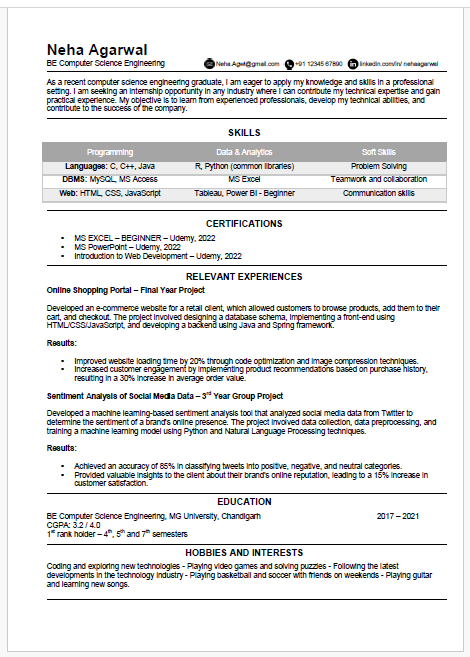Computer Science Engineering Internship
BE Computer Science Engineering

About this template
This is a very simple and professional resume which can effectively highlight your skills and experiences in a clear and concise manner.
This resume is made by MS Word, featuring a clean and modern layout designed to highlight your skills and achievements. Tailored to your industry, it ensures you stand out to recruiters and make a lasting impression.
Some most popular job roles for BE Computer Science Engineering graduate
BE Computer Science Engineering graduates have a wide array of career opportunities in various industries. Here are ten popular job roles for these graduates:
1. Software Developer:
Software developers are responsible for designing, coding, testing, and maintaining software applications. They work with programming languages like Java, C++, and Python to develop both desktop and web applications, ensuring they meet user needs and are efficient.
2. Web Developer:
Web developers specialize in creating websites and web applications. They use technologies such as HTML, CSS, JavaScript, and frameworks like React or Angular to build responsive and user-friendly web interfaces that provide a seamless user experience.
3. Data Scientist:
Data scientists analyze large sets of data to extract insights and inform business decisions. They use statistical methods, machine learning algorithms, and tools like R and Python to analyze data trends, predict outcomes, and optimize business strategies.
4. System Analyst:
System analysts evaluate and improve IT systems within an organization. They gather requirements, analyze existing systems, and recommend solutions to enhance efficiency and productivity. This role involves both technical and business-oriented tasks.
5. Network Engineer:
Network engineers design, implement, and manage computer networks. They ensure secure and reliable communication between devices, troubleshoot network issues, and optimize network performance using knowledge of TCP/IP, routing, and switching protocols.
6. Cybersecurity Analyst:
Cybersecurity analysts protect an organization's information systems from cyber threats. They monitor networks for security breaches, implement protective measures, and develop protocols to secure sensitive data, ensuring compliance with security standards.
7. Cloud Engineer:
Cloud engineers specialize in designing, deploying, and managing cloud-based systems. They work with platforms like AWS, Azure, or Google Cloud to build scalable and efficient cloud solutions, focusing on performance, security, and cost optimization.
8. AI/ML Engineer:
AI/ML engineers develop algorithms and models for artificial intelligence and machine learning applications. They work on projects ranging from natural language processing to computer vision, using tools like TensorFlow and PyTorch to build intelligent systems.
9. DevOps Engineer:
DevOps engineers bridge the gap between development and operations teams, focusing on automation and continuous integration/continuous deployment (CI/CD) processes. They use tools like Jenkins, Docker, and Kubernetes to streamline the software delivery pipeline.
10. IT Consultant:
IT consultants advise organizations on how to leverage technology to achieve business goals. They assess existing IT systems, recommend improvements, and help implement new technologies, ensuring that IT infrastructure aligns with business strategies.
Conclusion:
These roles leverage the technical knowledge and problem-solving skills gained during a BE in Computer Science Engineering program, offering diverse career paths in the ever-evolving tech industry.